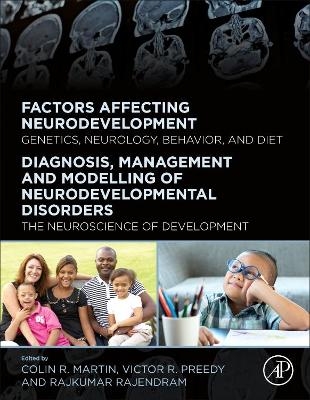
The Neuroscience of Normal and Pathological Development
Academic Press Inc
978-0-12-818371-7 (ISBN)
Factors Affecting Neurodevelopment: Genetics, Neurology, Behavior, and Diet is a comprehensive reference on the genetic and behavioral features associated with proper and abnormal development. This book discusses the mechanisms underlying neurological development and provides readers with a detailed introduction to the neural connections and complexities in biological circuitries, as well as the physiological, behavioral, molecular, and cellular features of neurodevelopment. It also examines in vitro and in vivo modelling of development with stem cells and model systems.
Colin R. Martin RN, BSc, MSc, PhD, MBA, YCAP, FHEA, C.Psychol, AFBPsS, C.Sci is Professor of Clinical Psychobiology and Applied Psychoneuroimmunology and Clinical Director of the Institute of Health and Wellbeing at the University of Suffolk, UK. He is a Chartered Health Psychologist and a Chartered Scientist. He also trained in analytical biochemistry, this aspect reflecting the psychobiological focus of much of his research within mental health. He has published or has in press well over 300 research papers and book chapters. He is a keen book author and editor having written and/or edited more than 50 books. These outputs include the prophetic insight into the treatment of neurological disease, Handbook of Behavior, Food and Nutrition (2011), Nanomedicine and the Nervous System (2012), Oxidative Stress and Dietary Antioxidants in Neurological Disease (2020), Zika Virus Impact, Diagnosis, Control and Models (2021), Factors Affecting Neurodevelopment: Genetics, Neurology, Behavior and Diet (2021), Diagnosis and Treatment of Spinal Cord Injury (2022), The Neurobiology, Physiology, and Psychology of Pain (2022) and The Handbook of Lifespan Cognitive Behavioral Therapy: Childhood, Adolescence, Pregnancy, Adulthood, and Aging (2023). Professor Martin is particularly interested in all aspects of the relationship between underlying physiological substrates and behavior, particularly in how these relationships manifest in both acute and chronic psychiatric disorder. He has published original research germane to significant mental health disorders including the areas of schizophrenia, anxiety, depression, self-esteem, alcohol and drug dependency, high secure forensic mental health and personality disorder. He has a keen interest in the impact of postviral illness and is actively involved in clinical research post-Covid pandemic and in particular, the impact of Long Covid on psychological, neurological, physiological and social functioning. He is involved in collaborative International research with many European and Non-European countries. Victor R. Preedy BSc, PhD, DSc, FRSB, FRSPH, FRSC, FRCPath graduated with an Honours Degree in Biology and Physiology with Pharmacology. After gaining his University of London PhD, he received his Membership of the Royal College of Pathologists. He was later awarded his second doctorate (DSc), for his contribution to protein metabolism in health and disease. He is Professor of Clinical Biochemistry (Hon) at King’s College Hospital and Emeritus Professor of Nutritional Biochemistry at King’s College London. He has Honorary Professorships at the University of Hull, and the University of Suffolk. Professor Preedy was the Founding Director and then long-term Director of the Genomics Centre at King’s College London from 2006 to 2020. Professor Preedy has been awarded fellowships of the Royal Society of Biology, the Royal College of Pathologists, the Royal Society for the Promotion of Health, the Royal Institute of Public Health, the Royal Society for Public Health, the Royal Society of Chemistry and the Royal Society of Medicine. He carried out research when attached to the National Heart Hospital (part of Imperial College London), The School of Pharmacy (now part of University College London) and the MRC Centre at Northwick Park Hospital. He has collaborated with international research groups in Finland, Japan, Australia, USA, and Germany. To his credit, Professor Preedy has published over 750 articles, which includes peer-reviewed manuscripts based on original research, abstracts and symposium presentations, reviews and edited books. Dr Rajkumar Rajendram is a clinician scientist with a focus on internal medicine, anaesthesia, intensive care and peri-operative medicine. He graduated with distinctions from Guy’s, King’s and St. Thomas Medical School, King’s College London in 2001. As an undergraduate he was awarded several prizes, merits and distinctions in pre-clinical and clinical subjects. Dr Rajendram began his post-graduate medical training in general medicine and intensive care in Oxford. He attained membership of the Royal College of Physicians (MRCP) in 2004 and completed specialist training in acute and general medicine in Oxford in 2010. Dr Rajendram subsequently practiced as a Consultant in Acute General Medicine at the John Radcliffe Hospital, Oxford. Dr Rajendram also trained in anaesthesia and intensive care in London and was awarded a fellowship of the Royal College of Anaesthetists (FRCA) in 2009. He completed advanced training in regional anaesthesia and intensive care. He was awarded a fellowship of the Faculty of Intensive Care Medicine (FFICM) in 2013 and obtained the European diploma of intensive care medicine (EDIC) in 2014. He then moved to the Royal Free London Hospitals as a Consultant in Intensive Care, Anaesthesia and Peri-operative Medicine. He has been a fellow of the Royal College of Physicians of Edinburgh (FRCP Edin) and the Royal College of Physicians of London (FRCP Lond) since 2017 and 2019 respectively. He is currently a Consultant in Internal Medicine at King Abdulaziz Medical City, National Guard Heath Affairs, Riyadh, Saudi Arabia. Dr Rajendram’s focus on improving outcomes from Coronavirus Disease 2019 (COVID-19) has involved research on point of care ultrasound and phenotypes of COVID-19. Dr Rajendram also recognises that nutritional support is a fundamental aspect of medical care. This is particularly important for patients with COVID-19. As a clinician scientist he has therefore devoted significant time and effort into nutritional science research and education. He is an affiliated member of the Nutritional Sciences Research Division of King’s College London and has published over 400 textbook chapters, review articles, peer-reviewed papers and abstracts.
Diagnosis, Management and Modeling of Neurodevelopmental Disorders: The Neuroscience Of Development:
I. Introductory Chapters: Setting The Scene For The Neuroscience Of Development 1. The brain and its structures: an overview; 2. Neural tube defects: embryonic origin, clinical features and cell survival equilibrium impact; 3. Chemical substances affecting neurodevelopment; 4. High-risk babies and Neurodevelopmental outcome; 5. Genomic Imprinting and neurodevelopment; 6. Insights from model systems: Alcohol, neurodevelopment and zebrafish; 7. Early life nutrition and brain development: maternal iodine nutrition and neurodevelopment; 8. Endocrine Aspects of Development. Thyroid hormone actions in neurological processes during brain development
II. Impairments and Diseases 9. Pediatric brain tumors; 10. Neurofibromatosis Type 1: from cellular phenotypes to human brain function; 11. The role and development of neural crest cells; 12. Spina Bifida: A Biopsychosocial Perspective; 13. Diabetic ketoacidosis and neurodevelopment; 14. Four-dimensional features of fetal brain: applications to diabetes; 15. Prenatally exposed to nicotine and neurodevelopment; 16. Maternal methamphetamine and impact on the brain; 17. Alcohol, cannabis and brain development; 18. The Environmental Pollutant Trichloroethylene Disrupts Key Neural Pathways During Brain Development; 19. Developmental neurotoxicity of the herbicide atrazine; 20. Neurodevelopmental delays and in utero hyperemesis gravidarum; 21. Neurodevelopment and Infantile Epileptic Encephalopathy-9 (EIEE9); 22. Neurodevelopment in Turner syndrome; 23. Very preterm children and the impact on neurodevelopmental outcomes; 24. Linking congenital heart disease and brain functional connectivity in newborns; 25. Brain Growth in Congenital Heart Disease from Prenatal Environment to Adulthood; 26. Linking dopamine, amphetamine and neurodevelopment; 27. Developmental coordination disorder
III. Biomarkers, Screening, Methods and Diagnosis 28. Neurodevelopment and the The Ages and Stages Questionnaire, third edition (ASQ-3); 29. Screening for Attention Deficit Hyperactivity Disorder in children; 30. The Mini-Mental State Pediatric Examination screening tool: Italian perspectives; 31. Predictors of neurodevelopment in preterm infants: from the neonatal intensive care unit into adulthood; 32. The antenatal fetal neurodevelopmental test: uses and applications
IV: Management and Treatments 33. Pain, evaluation and management in neurodevelopmental conditions; 34. Use of levetiracetam: Features and applications to neonatal seizures; 35. Quetiapine treatment in paediatric scenarios; 36. Treatments with cannabinoids and brain development; 37. Pediatric dystonia and deep brain stimulation; 38. Use of repetitive transcranial magnetic stimulation in neurodevelopment: a narrative review; 39. Cognitive behavioral therapy in children with anxiety disorders; 40. Cognitive behavioral therapy for anxiety in children with autism spectrum disorder; 41. Nutritional treatment in fetal alcohol spectrum disorder; 42. Nurturing the Developing Brain to Reduce Neurological Delay; 43. Normalizing perinatal neurological development via intervention
V. Models And Modelling 44. Microplatforms as a Model for Neurological Conditions; 45. Disease models in neurodevelopmental disorders; 46. Endosulfan and impact on neurodevelopment: modelling with zebrafish (Danio rerio); 47. Neurodevelopment of the zebrafish spinal serotonin system; 48. Inbred mouse model of brain development and intestinal microbiota; 49. The myelin mutant taiep rat as a model of developmental disorder; 50. The MAM-E17 neurodevelopmental model of schizophrenia
VI. Resources 51. Research and recommended resources in the neuroscience of development Factors Affecting Neurodevelopment: Genetics, Neurology, Behavior, and Diet: I. Genetics, Molecular and Celluar Biology 1. Hereditary motor neuropathies; 2. Dopamine transporter (DAT1) polymorphism and development; 3. Genome wide association studies (GWAS) and neurodevelopment: Autism spectrum disorder; 4. SNPs and cerebral palsy; 5. Epigenetic regulation of cortical neurogenesis; 6. Functions and dynamics of axonal mitochondria; 7. Linking apoptosis and caspases in fetal neural tube defects; 8. Brain oxidative stress in Down syndrome; 9. Linking Adhesion GPCRs to Glial Cell Development and Function; 10. Immunoglobulin cell adhesion molecule superfamily and neurodevelopment; 11. Brain-derived neurotrophic factor (BDNF) and neurogenesis; 12. slc7a5 and neural development; 13. Linking SOX3, SRY and disorders of neurodevelopment; 14. Neuronal Src-homology-2 (SH2)B adaptor protein-1 (Sh2b1) and brain growth; 15. Effects of extrinsic factors and intracellular signalling and transcription factors regulating the development and cell fate of spinal cord ependymal cells; 16. Signaling molecules controlling oligodendrocyte development and brain myelination
II. Neurological and Imaging Features 17. Fetal brain structures: imaging oriented; 18. Four-dimensional (4D) ultrasonography: Methods, uses and fetal neuroscience; 19. Linking histology and neurological development of the fetal and infant brain; 20. Development of Corticospinal tract axons: from embryonic stage to adulthood; 21. Vascular endothelial growth factor (VEGF) and neurodevelopment; 22. Brain-wide connectivity architecture: developmental aspects; 23. Development and pathology of the germinal matrix; 24. Development of the GABAergic network in the mouse spinal cord; 25. Postnatal development, electrophysiology and sensory sural nerves; 26. Neuroscience of the developing axonal strata in the human fetal brain; 27. Neuroactive steroids and neurodevelopment; 28. Voltage and ligand-gated ion channels appearance and function in neurodevelopment; 29. Features of brain development over 13 years in preterms; 30. The medial pulvinar in neurodevelopment; 31. Cortical sulci in the human fetal brain and development; 32. The prenatal development of the human cerebellum; 33. Developing cerebello-cerebral connectivity in health and disease: a focus on epilepsy; 34. Prenatal exposure to progestins: impact on neurodevelopment of the child
III. Physiological Aspects 35. Brain lesion characteristics in relation to upper limb function in children with unilateral cerebral palsy; 36. Maternal exercise and brain development; 37. Pyramidal neurons: physiology, Pathophysiology and postnatal development; 38. Working memory: physiology and neurodevelopment; 39. EEG development in resting states; 40. Availability and metabolism of thyroid hormones in the developing brain
IV. Behavior And Psychopathological Aspects 41. Psychosocial issues and quality of life following childhood stroke; 42. Neuropsychological function following childhood stroke; 43. Youths with autism and working memory; 44. Linking the mesial temporal lobe, 3D probabilistic maps and development; 45. Cognitive aspects of Down Syndrome; 46. Adolescent cannabis use and neurocognitive development; 47. The Role of Social Anxiety in Autism and the Broader Autism Phenotype: Evidence from Childhood through Adulthood; 48. Impact of touch on bonding and neurodevelopment; 49. Neurobehaviour and catch up growth
V. Diet And Nutrition 50. Caloric restriction and the developing brain; 51. High-fat diet, tryptophan hydroxylase-2 mRNA expression and neurodevelopment; 52. Bone mineral density and nutritional status in children with cerebral palsy; 53. Epigallocatechin-3-gallate: linking the neurogenesis, hippocampus and Down syndrome; 54. Folic acid-to prevent spina bifida and anencephaly
| Erscheint lt. Verlag | 25.6.2021 |
|---|---|
| Zusatzinfo | 500 illustrations (250 in full color); Illustrations |
| Verlagsort | San Diego |
| Sprache | englisch |
| Maße | 216 x 276 mm |
| Gewicht | 3850 g |
| Themenwelt | Geisteswissenschaften ► Psychologie ► Entwicklungspsychologie |
| Naturwissenschaften ► Biologie ► Humanbiologie | |
| Naturwissenschaften ► Biologie ► Zoologie | |
| ISBN-10 | 0-12-818371-3 / 0128183713 |
| ISBN-13 | 978-0-12-818371-7 / 9780128183717 |
| Zustand | Neuware |
| Informationen gemäß Produktsicherheitsverordnung (GPSR) | |
| Haben Sie eine Frage zum Produkt? |
aus dem Bereich


